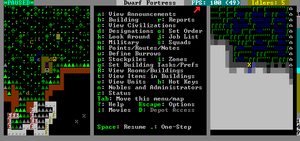v50 Steam/Premium information for editors
- v50 information can now be added to pages in the main namespace. v0.47 information can still be found in the DF2014 namespace. See here for more details on the new versioning policy.
- Use this page to report any issues related to the migration.
This notice may be cached—the current version can be found here.
v0.31:Maximizing framerate
Jump to navigation
Jump to search
| This article is about an older version of DF. |
Template:L is used in Dwarf Fortress to measure the speed at which the game is running. To check your frames per second (FPS) in Dwarf Fortress, change [FPS:NO] to [FPS:YES] in the Template:L file. Two values will be displayed on the top right of the screen, the first value is the current frame rate, while the number in parenthesis is the current graphical frame refresh rate.
Increasing Framerate
- Limiting the number of Dwarves and other moving units (cage or butcher animals) greatly helps keep speed up.
- Due to a bug, contaminants such as blood, snow, et cetera, count as items. Since contaminants can spread and you cannot easily get rid of them, try to avoid things that spread contaminants: wells, killing things in high traffic spots, and soap.
If you have a beast that exudes slime, you might as well save your game and wait for an update. Or kill it and use dfcleanmap.
- Destroy contaminants that Dwarves and pets are carrying around. To achieve this, one can either build a shallow pool in an often-visited area. When the dwarves walk through the water, the contaminants will be washed away. One may also use hacking tools to place some 7/7 water splatters around important paths with dfliquids while running dfcleanmap continuously to remove the contaminants that gets washed away from the dwarves.
- Decreasing the G_FPS in the init text file can improve FPS. Be careful however, decreasing it too much can subject you to "incomprehensible graphic instabilities". Remember, with a low G_FPS, it can be dangerous during combat, because the screen does not update as often. The default G_FPS is 50, but setting it as low as 20 G_FPS may work with minimal problems. Performance varies on different systems, one will have to test different G_FPS values to find which performs to the user's preferences.
- PRINT_MODE, also in the init file, may allow Dwarf Fortress to take advantage of the abilities of newer graphics cards. While the default setting is the most reliable, it is possible that changing the print mode could increase FPS. Users will have to test to see which runs best on specific systems.
- Disabling temperature and weather in the d_init.txt| file increases FPS due to fewer calculations being required. A downside to disabling weather is the removal of rain, which will will clean the map of contaminants, so it is possible that leaving it on may improve FPS.
- World size and embark zone size affect RAM usage, which may effect speed. FPS may be increased by choosing smaller embark zones.
- Changing the value of "normal" traffic zones in the init file to 1 may increase FPS created by open space, though this causes "high" traffic zones to be useless. Alternatively, one can cover the entire map with a "high" traffic zone, which will allow other traffic zones to function properly at their defaults.
- Closing one's fortress entrance with a raised bridge or forbidden door decreases the number of possible routes that the pathfinder needs to calculate, which may aid performace.
- Reducing the number of items on a map by "atom smashing" them or donating them to traders.
- Less mining reduces the number stones and corridors that exist, which may increase performance.
